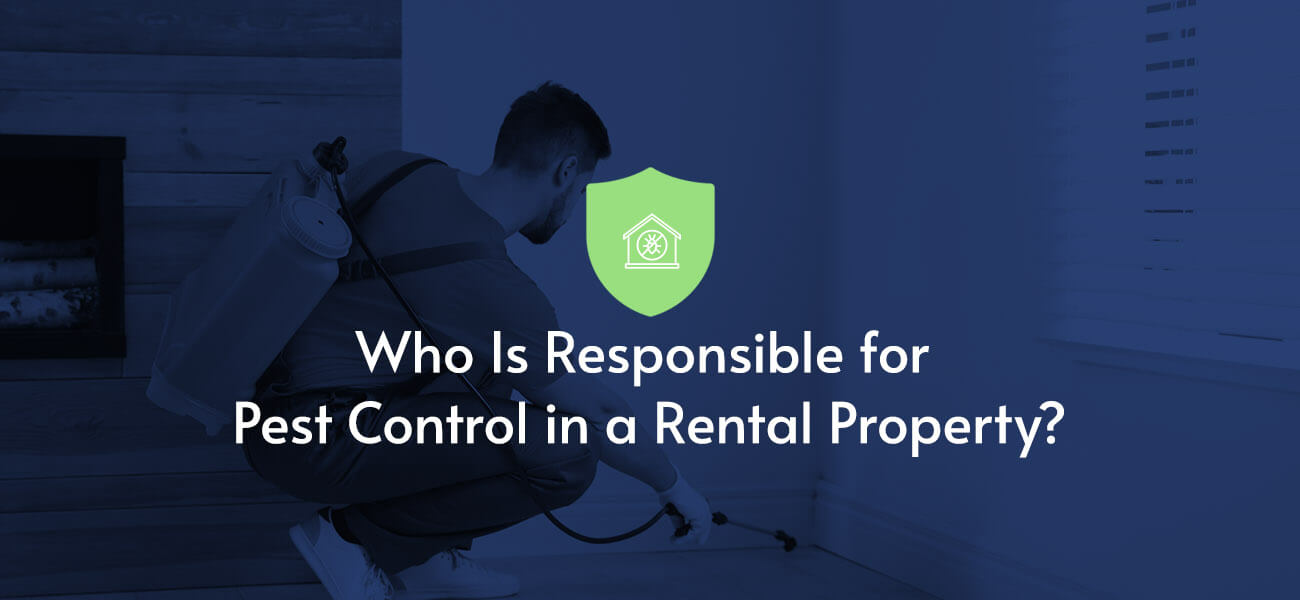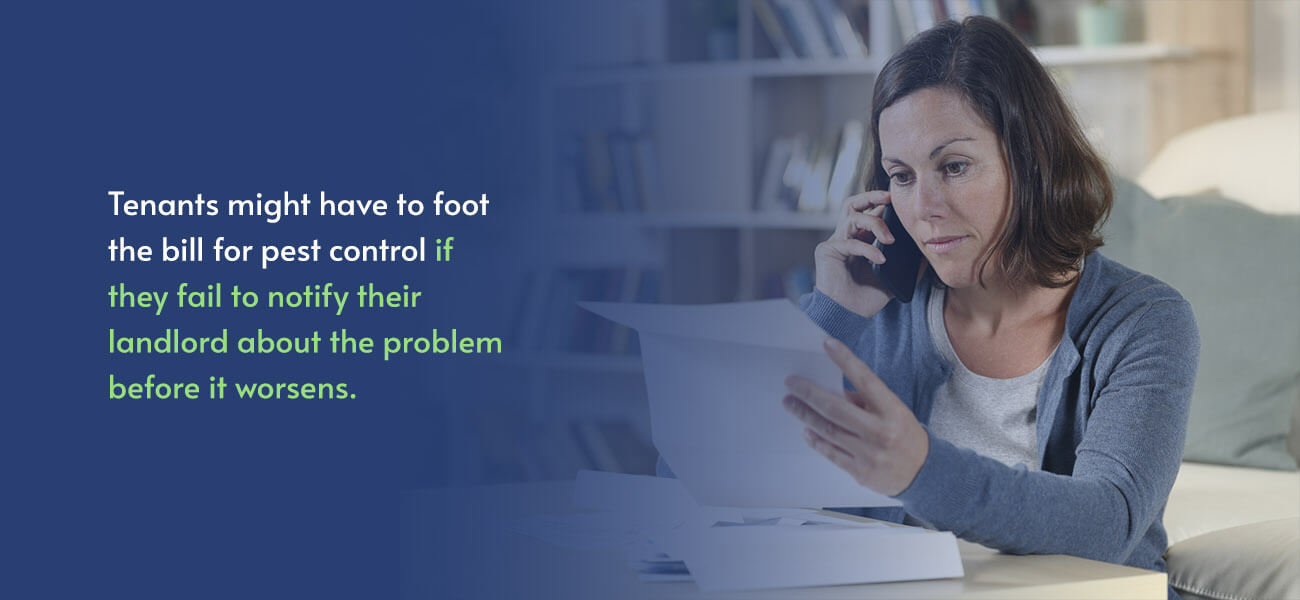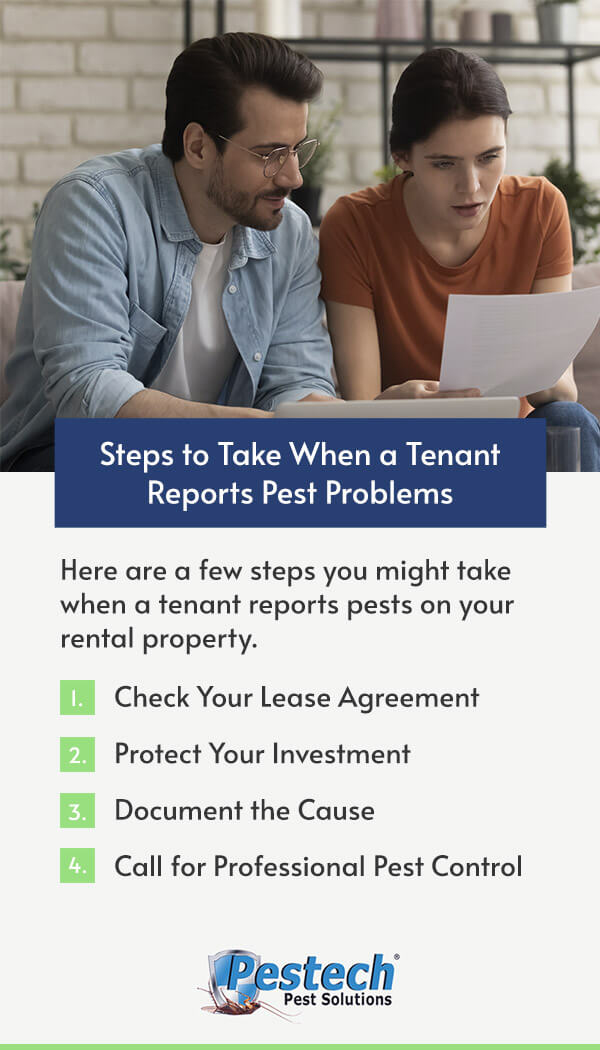Who Is Responsible for Pest Control in a Rental Property?

Whether you’re a tenant or landlord, pest control for rental properties is essential to maintain a safe and habitable environment. While pests can present health problems for tenants, they can also damage the property itself.
When you have small animals invading through unpatched holes or ants and roaches from improper cleaning, removing them should be your top priority. If you rent property to others, this issue raises a critical question — who is responsible for pest control when renting? Keep reading as we break down landlord and tenant responsibilities and how to address pest control for rental properties.
Landlord vs. Tenant Responsibility

Generally, the landlord’s responsibility is to ensure the rental property is up to code and habitable. New York’s Housing and Maintenance Code states that tenants have a right to a bed bug-free living environment. Landlords must disclose a history of bed bugs to future tenants, and infestations are a violation landlords must address within 30 days. Landlords will likely pay for pest control as well.
While these laws are specifically about bed bugs rather than all pests, New York is an excellent state for enforcing the warranty of habitability, which covers tenants in most cases. However, the financial responsibility for infestations might fall upon a renter whose lifestyle causes the pest problem. For instance, a messy apartment with incorrectly stored food is an example of living conditions conducive to pest issues.
Landlord Responsibilities
Is a landlord responsible for pest control? In most cases, the answer is yes. If a tenant reports an issue, the landlord must check with their neighbors to prevent a widespread infestation. Their duty is to identify the problem and solve it by calling upon professional pest control.
A complete list of landlord responsibilities is as follows:
- Comply with all habitability standards and building codes.
- Promptly react to reports of pests.
- Inspect, identify and repair any vulnerable points of entry.
- Communicate with tenants to determine the extent of the issue and prepare extermination.
- Hire a qualified pest control professional to Identify and remove the pests.
- Consider ongoing or seasonal preventive treatments.
- Provide educational materials to residents on pest prevention.
Most landlords will make seasonal arrangements for control and prevention and pay for it so problems don’t worsen. But as we already mentioned, just because the landlord hires a pest control company doesn’t mean they’re responsible for paying the bill.
Tenant Responsibilities
Tenants must not bring in any pests and should report pest issues immediately. They should keep their apartment clean and free of food waste, while regularly taking out the trash and controlling fleas on pets. They should also be careful not to invite over guests who are actively experiencing pest problems, especially for pests like bed bugs that spread quickly from person to person.

Tenants might have to foot the bill for pest control if they fail to notify their landlord about the problem before it worsens. It’s also essential to report structural problems immediately, such as leaks that can attract pests.
A complete list of tenant responsibilities is as follows:
- Immediately report any evidence or suspicion of pests to your landlord.
- Keep the property clean and free of food waste.
- Treat pets with evidence of fleas and consider taking seasonal preventive treatment as directed by your vet.
- Report any potential entrances to the home’s exterior where pests could get in.
- Remove and store garbage in exterior sealed containers.
- Be mindful not to bring in pests from other places.
Determining Tenant Responsibility
Specific situations make tenants or landlords financially responsible for rental property pest control. While the implied warranty of habitability requires landlords to maintain living conditions, a pest infestation can jeopardize that.
What if the infestation occurs from natural circumstances, like the rental property being near a grassy field where tenants report mice? In that case, the landlord must hire and pay the exterminator. Other natural pest conditions include spiders, termites, ants, wasps, rats, cockroaches and bed bugs.
On the other hand, if the landlord can prove their tenant caused the infestation, the renter may be financially responsible for pest control services. Sometimes, the exterminator can help you determine whether a tenant’s living conditions attracted the pests. Poor housekeeping, moisture or infestation from pets might make pest control a renter’s responsibility.
Poor Housekeeping
If a pest infestation is due to tenant behaviors or activities, such as sloppy housekeeping, it’s up to the tenant to bear the financial responsibilities. Unclean areas attract some pests like ants or cockroaches. If the tenant has trouble regularly taking out the garbage or keeping food covered and put away, they may attract pests.
Pest control for rental properties begins with education on proper care and recognizing common signs of pests. Landlords and tenants should be on the same page with these issues. Landlords should take the time to educate tenants on the red flags of pest infestation and review cleanliness standards. Further, encourage tenants to report pests immediately, and ensure they know they are liable for failing to do so.
Landlords who discover poor living or pet conditions may want to issue a Notice to Cure to ensure the tenant won’t attract pests to the property in the future. New York law says landlords should clearly state the reasons on the notice to give tenants reasonable awareness to correct the issue or vacate the property.
Excess Moisture
Excess moisture from poor upkeep and failing to report leaks can also attract specific pests. Finding a warm, humid place to lay eggs allows their population to thrive. Add a reliable food source, and you can expect a complete infestation. Tenants can look for these pasts in areas like bathrooms, kitchens and basements near a furnace or water heater:
- Cockroaches
- Silverfish
- Centipedes
- Earwigs
- Mosquitoes
Pests might also congregate near dripping faucets or leaky pipes. Without proper maintenance by the landlord, these pipes can add moisture to the air. Regularly checking the plumbing is essential, as is ventilating kitchens and bathrooms with exhaust fans. Tenants can also place fans in open windows to exhaust warm air and blow cooler air in.
Pets
A flea infestation can also result from the tenant’s pet, making it their responsibility to pay for treatments. The two most common fleas in the U.S. are cat and dog fleas, which burrow into pets’ fur to hide and feed. They then lay eggs that will hatch and cause a flea infestation that will need treating.
Pets might come into contact with other animals or fleas in their environment. Without taking the proper precautions to prevent fleas from attacking pets, tenants can become responsible for paying for pest control.

Steps to Take When a Tenant Reports Pest Problems
Here are a few steps you might take when a tenant reports pests on your rental property.
1. Check Your Lease Agreement
A thorough and legal lease is the best way to avoid disputes between landlords and tenants. Landlords should always include pest control responsibilities in the lease agreement. That way, a pest control clause can specify potential problems and help determine responsibility in the event of an infestation.
2. Protect Your Investment
If you’re a landlord, you shouldn’t leave seasonal pest control to the tenant, as their chosen prevention methods may not be up to your high standards. While the tenant has the right to live in the property, it still belongs to you, so you should protect your investment by keeping up with complete pest prevention treatments.
If you’re working with a property manager or a company, ask them about the pest control options they’ll include and how they handle preventive care.
3. Document the Cause
If you can document that the tenant is responsible for the pest infestation, you might be able to have your renter pay for pest control. You can do this by setting up a rental inspection and ensuring the tenant has proper notice. Document the problems by taking pictures of the environment that may have led to the pest issues. You might also hire professional exterminators to help you determine whether the tenant caused the problem.
4. Call for Professional Pest Control
Using experienced pest control technicians is the best way to manage your rental investment, address immediate pest control problems and access routine preventive maintenance.
While regular pest management may be integral to maintaining a rental property, landlords should know that the New York State Environmental Conservation Law regulates pesticides. The law specifically states that only certified commercial applicators can use these chemicals. Further, only pest professionals licensed by the New York State Department of Environmental Conservation can use pesticides to control pests.
Pestech is a trusted GreenPro Quality Pro, which means we always use the most environmentally friendly materials possible. While this is critical for following the law, it also means low risk, odors and environmental impact for your rental property.
Tenant Pest Control Rights
When a landlord neglects to provide pest control for rental properties and an infestation is not the tenant’s fault, a renter can then take the following steps.
Withhold Rent
If you fail to listen to the tenant’s concerns and immediately address the infestation, your renters could withhold rent until you fix the issue. In New York, they’ll need to notify you in writing when they intend to stop paying, giving you one more chance to solve the problem. They can also call a building inspector to find violations and get proof of issues that need fixing.
Move out and Break the Lease
Breaking a lease usually results in significant legal and financial consequences. However, if the landlord doesn’t follow their responsibilities, the tenant may have grounds to do so. Tenants can also file a formal complaint with the city or state health department. They can issue a violation to you if their inspection determines their complaint is valid.
If you don’t meet the standards to control the pests within the allowable period and the tenant gives proper notice, a tenant may meet “constructive eviction” standards. As a result, they will have no obligations to pay rent, given that you have not met your responsibilities under New York landlord-tenant law. Habitable premises require the landlord to keep multiple dwellings and public areas in good repair, clean and sanitary conditions and clear of vermin.
Move Into Temporary Housing
Depending on the rental agreement’s terms, tenants may be able to move into temporary housing if the landlord fails to remedy the pest problem, deducting the cost from their next month’s rent. If you don’t return the unit to a livable condition within a reasonable time, the tenant could break the lease.
File a Lawsuit
Tenants also have the right to bring a case against the property owner in Housing Court to get an order to correct the living conditions, called an HP action. HP actions are lawsuits brought by tenants against landlords to force them to make repairs or provide essential services. When a landlord neglects to do these things, it might be a violation of the New York Housing Code. In Housing Court, a judge can order the landlord to correct the violations.
Lawsuits may be more relevant when an infestation affects entire buildings or complexes. In these cases, a class-action lawsuit pits the tenant and their neighbors against the landlord. Since it’s easier to prove that a landlord has violated a warranty of habitability when pest issues affect many people in several apartments, judges often resolve these cases in the tenants’ favor or settle them out of court.
Pest Control Services With Pestech
Pests can carry disease and compromise living conditions for your tenants. They can also damage reputations. To ensure your property value and housing quality, you should take pest control as seriously as we do. Whether you own a multifamily home or an apartment complex, Pestech has you covered.
At Pestech, our licensed and certified professionals protect you with annually updated risk assessments that minimize your chances of damage from pest problems. When you use our property management program, we guarantee your property will pass inspections and protect your tenants. We customize the program to your needs to deliver the attention and quality care you deserve. We’ll create an effective solution for your company, ensuring comprehensive services and regular inspections using the best people, technology and science.
We even provide environmentally conscious pest control solutions with our GreenPro pest management service. This approach uses mechanical and target-specific methods to eliminate pests while protecting the surrounding environment.
Our experts have 33 years of experience clearing pests from apartment buildings and residential properties, and we look forward to doing the same for you.
To learn more about pest control for rental properties, contact us today.

